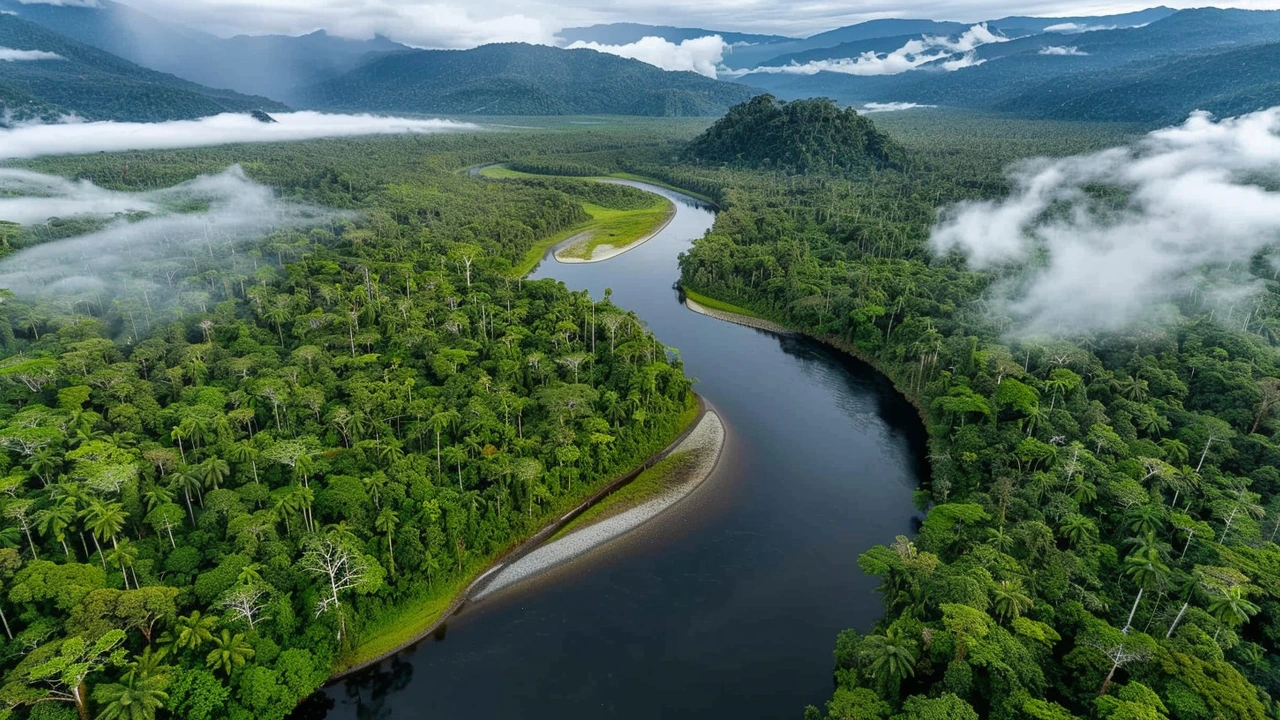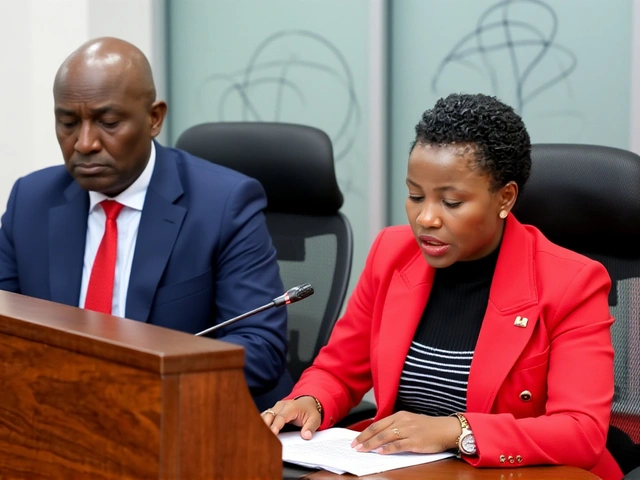Understanding the 'Biotic Pump' Theory
In the ongoing quest to comprehend Earth's complex climate system, the 'biotic pump' theory introduced by Anastassia Makarieva and Viktor Gorshkov stands out for its provocative implications. First put forward in 2010 and published in 2013, this theory challenges longstanding principles in climate and hydrological science. At its core, the 'biotic pump' concept contends that forests have a central role in driving wind and water cycles, fundamentally altering the way we understand these crucial processes.
Makarieva and Gorshkov posit that forests generate moisture-laden air currents, thereby governing wind and rain patterns across large distances. If substantiated, their theory could transform climate modeling, shedding new light on atmospheric dynamics. This notion intriguingly contradicts traditional climate science, which typically attributes wind patterns to temperature and pressure gradients influenced by oceanic movements and topographical features. The ramifications of such a shift in understanding are profound, especially in the context of climate change and forest conservation efforts.
The 'Cold Amazon Paradox'
One of the most striking aspects of the 'biotic pump' theory is its potential explanation for the 'cold Amazon paradox.' This phenomenon refers to the seemingly counterintuitive movement of wind from the warmer Atlantic Ocean into the comparatively cooler Amazon basin. According to Makarieva and Gorshkov, forests in the Amazon drive this airflow by creating low-pressure zones through evapotranspiration, a process where water is transferred from land to the atmosphere by evaporation from the soil and transpiration from plants. This low-pressure zone then pulls in moist air from the Atlantic, resulting in expansive rainforests that are crucial for local and global climate regulation.
Traditional theories struggle to explain the cold Amazon paradox, often attributing it to complex ocean-atmosphere interactions that don't completely align with observed patterns. The 'biotic pump' theory offers an alternative perspective, suggesting that the vegetation itself could be a significant driver of these atmospheric behaviors. This insight underscores the need to incorporate biological factors into climate and weather models, an area that has perhaps been underemphasized in the scientific narrative thus far.

Implications for Climate Modeling and Policy
If Makarieva and Gorshkov's theory holds true, it suggests that deforestation could have even more devastating consequences than currently understood. The loss of forests could disrupt these vital moisture and wind cycles, leading to shifts in weather patterns that could impact agriculture, water supplies, and biodiversity. Such disruptions could further intensify climate challenges, exacerbating issues like droughts in some regions and flooding in others.
The potential inclusion of the 'biotic pump' theory in climate models could refine predictions and policies aimed at mitigating climate change. Understanding the full impact of forests on global hydrology and atmospheric dynamics would highlight the need for stronger forest conservation measures. Policymakers might need to prioritize reforestation and afforestation initiatives and reinforce legal frameworks to prevent deforestation.
Scientific Debate and the Need for Further Research
While the 'biotic pump' theory holds promise, it has not been universally accepted within the scientific community. Critics argue that more empirical evidence and comprehensive studies are needed to substantiate the theory's claims. Given the complex interplay of factors that drive climate and weather patterns, isolating the specific contributions of forest biotic processes requires sophisticated and extensive research methodologies.
Despite these challenges, the theory has garnered enough attention to warrant significant scholarly exploration. Its potential implications for understanding and mitigating climate change make it a subject of ongoing investigation. Researchers are urged to undertake field studies, remote sensing analyses, and modeling efforts to either validate or refute the theory's core tenets. The outcome of such research could redefine climate science, offering new tools and strategies for addressing one of the most critical issues of our time.

Makarieva's Insights on Mongabay's Podcast
Recently, Anastassia Makarieva shared insights about the 'biotic pump' theory on Mongabay's podcast, discussing its implications for future climate modeling. She emphasized the need for interdisciplinary collaboration to fully understand the complex mechanisms at play. Makarieva called for an integration of biological sciences with traditional meteorology and climatology to develop more accurate and comprehensive models.
During her podcast appearance, Makarieva reiterated that forests could play a pivotal role in regulating the planetary climate beyond their well-recognized functions of carbon sequestration and biodiversity support. Her arguments highlight the urgency of taking a holistic approach to environmental conservation, integrating ecological health into broader climate action frameworks. Addressing forest loss from this multifaceted perspective could be an essential strategy for building a resilient future in the face of climate uncertainties.
Conclusion: Embracing a New Paradigm in Climate Science
The 'biotic pump' theory by Anastassia Makarieva and Viktor Gorshkov challenges us to rethink the integral roles forests play in Earth's climatic systems. While its acceptance within the scientific community is yet to be solidified, the theory's potential to reshape climate modeling and policy is undeniable. As researchers continue to probe the validity of the 'biotic pump,' the pursuit of such knowledge could unveil more sophisticated and effective approaches to combating climate change and preserving our planet's ecological balance.
Whether the theory is ultimately proven or not, it already serves as a compelling reminder of the interconnectedness of all natural systems. Forests, often termed the 'lungs of the Earth,' may well be its 'hearts' too—driving the rhythms of wind, water, and weather that sustain life.







Comments
Yogesh Popere
Forests aren't just trees, they're climate engines. Cut them down and you're not just losing carbon sinks-you're breaking the planet's water pump. Simple as that.
Manoj Rao
Ah yes... the biotic pump... the only theory that dares to say nature isn't passive-oh wait, that's heresy in climate science, isn't it? The same science that still thinks CO2 is the only villain, while ignoring the living, breathing, transpiring heart of the system... It's all connected, you see... the trees breathe... the winds obey... and the economists? They just count trees as lumber.
Alok Kumar Sharma
This theory is garbage. Wind is caused by pressure differences. Not trees.
Tanya Bhargav
I've seen forests in the Western Ghats after monsoon-there's a quiet hum in the air, like the land itself is breathing. I don't need a model to feel that. This theory makes sense in my bones.
Sanket Sonar
The biotic pump hypothesis introduces a non-linear feedback loop between evapotranspiration and barometric gradients that traditional GCMs fail to parameterize. The spatial coherence of moisture transport across continental scales suggests a non-stochastic driver-likely vegetation-mediated.
pravin s
I never thought about forests like this before. But now it makes so much sense-trees aren't just sitting there, they're pulling rain from the ocean. That's wild.
Bharat Mewada
We've spent centuries thinking of nature as something to be measured, controlled, exploited. But what if it's not a machine? What if it's a living conversation-between roots and winds, between leaves and clouds? The biotic pump isn't just science-it's poetry made real.
Ambika Dhal
Of course forests matter. But this theory is just a distraction. The real problem? Capitalism. Corporate greed. Politicians selling forests for roads and mines. Stop romanticizing trees and start burning down the system that kills them.
Vaneet Goyal
I'm not saying this theory is wrong... but let's be real-how many peer-reviewed papers actually prove this? Where's the data? Where's the replication? Science isn't about beautiful ideas-it's about evidence. And right now, this is just a hypothesis with a nice name.
Amita Sinha
I just cried reading this. 🌧️🌳 We're killing the planet's heartbeat and everyone's still arguing about carbon credits. The Amazon isn't a resource-it's a mother. And we're cutting her arteries.
Bhavesh Makwana
This is the kind of thinking we need more of. Not just fixing symptoms-understanding the whole system. If forests are the pumps, then protecting them isn't conservation-it's infrastructure. We need to fund this like we fund satellites and rockets.
Vidushi Wahal
I grew up near a forest that vanished for a highway. The rains changed after that. Not dramatically-but enough. I didn't know why. Now I think... maybe it wasn't coincidence.
Narinder K
So trees make wind? Next you'll tell me my coffee makes my alarm clock go off.
Narayana Murthy Dasara
Hey, I'm not a scientist, but I love how this connects everything. Trees, rain, wind, even our food. It's like nature has its own internet-and forests are the routers. We're unplugging the whole network and wondering why the internet's down.
Yogesh Popere
You think it's just about wind? Look at the Sahel. Forests gone → droughts. Rain doesn't come. People starve. This isn't theory-it's a death sentence we're ignoring.